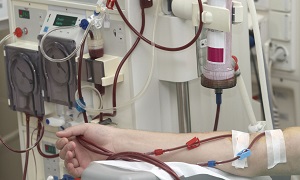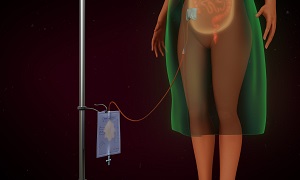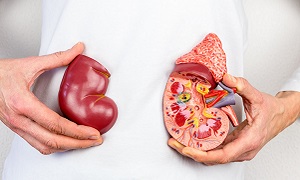Best Doctors in India for Chronic Kidney Disease Treatment
Best Hospitals in India for Chronic Kidney Disease Treatment
- City: Bengaluru, India
Hospital Highlights:
- Fortis Hospital Bannerghatta, Bengaluru was established in 2006.
- The hospital is a 276 bedded multi-specialty tertiary care facility.
- The hospital specializes in cutting-edge medical technology and dedicated patient care services.
- The hospital is equipped with state-of-the-art technologies like trans-radial angioplasty, trans-abdominal cardiac surgery, and computerized TKR navigation surgery.
- The hospital provides specialty medical services in cardiology, cardiac surgery, orthopedics, neurology, neuro-surgery, GI, and Minimal Access Surgery (MAS).
- City: Chennai, India
Hospital Highlights:
- Fortis Malar was established in 1992 and was formerly known as Malar Hospital.
- The hospital specializes in cutting-edge medical technology and dedicated patient care services.
- The hospital is multi-specialty, tertiary care facility with 180 beds.
- The hospital offers comprehensive medical care in specialties such as cardiology, cardio-thoracic surgery, neurology, neurosurgery, orthopedics, nephrology, gynecology, gastroenterology, urology, pediatrics, and diabetes.
- City: New Delhi, India
Hospital Highlights:
- Established in 1996, Pushpawati Singhania Research Institute is one of the top hospitals in the NCR region, as well as one of the top facilities in India for gastroenterology. The hospital is one of South Asia’s first institutes in medical and surgical treatment for diseases related to digestion.
- The hospital is equipped with state-of-the art facilities coupled with the latest equipment as well as renowned consultants from various parts of India as well as other parts of the world.
- City: New Delhi, India
Hospital Highlights:
- State-of-the-art technology and devoted healthcare professionals have been brought together under one roof at Venkateshwar Hospital to provide genuine medical care. The hospital’s professionals work together as a team to deliver the best possible treatment to their patients, using the most sophisticated equipment and information technology.
- Venkateshwar Hospital’s mission is to attain global excellence in healthcare by employing evidence-based, ethical clinical practices and cutting-edge technology by a team of highly skilled experts.
- City: New Delhi, India
Hospital Highlights:
- Sir Ganga Ram Hospital, New Delhi is known to provide the latest medical procedures with the latest technology in all of its units.
- The hospital has a team of reputed doctors, nurses, and healthcare professionals that ensure that patients receive quality care at affordable costs.
- Staffed with a team of highly qualified doctors, dedicated nurses, and paramedical and non-medical staff, the hospital aims to lead in healthcare delivery, medical education, training, and research.
- As per the vision of the founder, the hospital also provides free treatment to the economically weaker sections of society.
- Sir Ganga Ram Hospital also provides training to young doctors under the Diplomate in National Board(DNB) program. The DNB program at the hospital was started in 1984 and it is known for currently running the maximum number of DNB specialties in the country. It also has the distinction of having the first bone bank in India.
- City: Kerala, India
Hospital Highlights:
- Established in 2019, Apollo Adlux Hospital is the first Apollo Hospital in Kerala and the 73rd hospital owned by Apollo Group in India. With the state’s most advanced, comprehensive healthcare infrastructure and cutting-edge technologies, Apollo Adlux Hospital stands as an example of medical excellence in Kerala.
- With over 34 multi-specialty departments, the hospital believes in providing the best quality treatment to its patients at affordable rates, ensuring comfort at their difficult times.
- The 300-bed hospital is managed by a team of highly qualified and experienced experts who delivers exceptional hospitality to their patients and treats them with great compassion.
- With its affiliation with the Apollo Hospitals Group, the hospital aims in providing patients with top-notch healthcare services while also serving communities in Kerala.
- The hospital has good railway and road connections, and is conveniently close to Cochin International Airport.
- City: Gurugram, India
Hospital Highlights:
- Situated near DLF Cyber City, Gurugram, Narayana Superspecialty Hospital is one of the top medical facilities in the Delhi NCR region, catering to the needs of the people. Known for its commitment to quality medical care and patient service, the hospital is a state-of-the-art facility with planned and well-equipped sections, which includes a spacious OPD area as well as comfortable patient rooms.
- It is the closest super-specialty hospital from Indira Gandhi International Airport towards Gurugram, and also the nearest super specialty hospital from DLF Cyber City. It is also close to major residential areas in Gurugram.
- It is part of the renowned Narayana Health Group. Established in 2000, by Dr. Devi Shetty, a renowned cardiac surgeon, it has grown to be one fo India’s leading healthcare groups.
- City: Noida, India
Hospital Highlights:
- Fortis Hospital, Noida, stands as one of the oldest and most trusted healthcare institutions in the region, setting a benchmark for comprehensive medical care.
- As the second mega hub hospital in the Fortis Healthcare Group, Fortis Hospital, Noida, upholds a legacy of trust among more than 1.2 million patients. By integrating top-tier professionals with cutting-edge technology, the hospital delivers superior treatment across various medical disciplines.
- Specializing in advanced Neurosciences, Orthopedics, Kidney and Liver Transplant Programmes, Fortis Hospital, Noida has successfully performed over 1,500 transplants, solidifying its reputation as a leader in specialized medical interventions.
Chronic Kidney Disease
Chronic kidney disease is a slow and progressive loss of kidney function over several years, in which the person eventually develops permanent kidney failure.
Also known as chronic renal failure, chronic kidney disease, is more widespread than people think, since it mostly goes undetected, and undiagnosed until the disease is at an advanced stage. Sometimes, it is even discovered when the function of the kidneys is down to 25 percent of normal. As this condition advances, the function gets impaired severely, and dangerous levels of fluid and waste can build up in the body rapidly. Treatment is therefore aimed at slowing down or stopping the progression of the disease, and this is often done by controlling the underlying cause.
Symptoms
If kidney damage progresses, then signs and symptoms of chronic kidney disease develops over time slowly. Some of the signs and symptoms include:
- Nausea
- Fatigue and weakness
- Vomiting
- Changes in how much you urinate
- Loss of appetite
- Sleep problems
- Decreased mental sharpness
- Muscle twitches and cramps
- Swelling of feet and ankles
- Persistent itching
- High blood pressure that becomes difficult to control
- Chest pain, if there is a build-up of fluid, around the lining of the heart
- Shortness of breath, if fluid builds up in the lungs
Sometimes signs and symptoms of kidney disease might be nonspecific, which means that they may be caused by other illnesses as well. The kidneys are highly adaptable and are also able to compensate for lost function, and therefore signs and symptoms might not appear until irreversible damage has occurred. If you see these signs and symptoms, then make an appointment with your doctor.
Causes & risk factors
Diabetes and high blood pressure are considered to be the most two common causes of chronic kidney disease. They are generally responsible for over two-thirds of the cases.
Diabetes occurs when your blood sugar is too high and causes damage to various organs in your body, which includes the kidneys, heart as well as blood vessels.
High blood pressure, also known as hypertension occurs when the pressure of your blood against the walls of your blood vessels increases. If it is not controlled properly, it can lead to strokes, heart attacks, or chronic kidney disease. Chronic kidney disease can also be a cause of high blood pressure. Some other conditions are also there, which might lead to kidney disease, some of them including:
- Glomerulonephritis, a group of diseases that causes inflammation and damage to the filtering units of the kidneys. These disorders are known to be the third common type of chronic kidney disease.
- There are also inherited diseases, such as polycystic kidney disease, which can cause large cysts to form in the kidneys and damage the surrounding tissue.
- Malformations can also occur as a baby develops in its mother’s womb. For example, there might be a narrowing that prevents the normal outflow of urine and causes it to flow back up to the kidney. This can lead to infections and might even damage the kidneys.
- Obstructions which are caused by problems like kidney stones, tumors, or an enlarged prostate gland in men
- Lupus and other diseases that affect the immune system of the body
- Repeated urinary infections.
The list of risk factors that can increase your risk of developing chronic kidney disease include:
- Diabetes
- High blood pressure
- Heart and blood vessel (cardiovascular) disease
- Obesity
- Smoking
- Family history of kidney disease
- Having an abnormal kidney structure
- Older age
People of African-American, Native-American, or Asian-American ethnicity are generally more likely to have this condition.
Diagnosis
First, your doctor is going to discuss your personal and family history with you, and might also ask questions about whether you have been diagnosed with high blood pressure, or if you have taken any medicine that can affect the function of the kidneys. He/she will also likely ask if you have any family members having kidney disease and if you have seen any changes in your urinary habits.
Next, your doctor will need to perform a physical exam, and check for signs of problems with your heart or blood vessels, and will also conduct a neurological exam.
Some other tests and procedures might also be required, which include blood tests, imaging tests, urine tests, and a kidney biopsy.
Treatment
Medications
Although there is no current cure for chronic kidney disease, there are some therapies that can help control the signs and symptoms, as well as reduce the risk of complications.
Patients suffering from chronic kidney disease generally need to take a large number of medications, and different kinds of treatments. Some of these include:
Anemia Treatment– Hemoglobin is the substance in red blood cells that carry vital oxygen around your body. When this hemoglobin becomes low, the patient is known to have anemia. Therefore, some kidney patients might require blood transfusions. A patient with kidney disease might also require iron supplements, either in the form of daily ferrous sulfate tablets or in the form of injections.
Skin itching- Patients with chronic kidney disease can also suffer from skin itching problems. In such cases, Antihistamines, like chlorphenamine, can help in alleviating symptoms of itching.
Phosphate Balance– People having kidney disease might also not be able to eliminate phosphate properly from their bodies. If this occurs, patients are generally advised to reduce their nutritional phosphate intake, which means reducing the consumption of red meat, fish, eggs as well as dairy products.
High Blood Pressure- A common problem among patients with chronic kidney disease is high blood pressure. It is important to bring it down to protect the kidneys, in order to slow down the progression of the disease.
Anti-Sickness Medications– If toxins build up in the body, because of the kidneys not working properly, patients might feel sick. Therefore anti-sickness medications can help to relieve this sickness.
End-Stage Treatment
End-stage treatment is required when the kidneys are functioning at less than 10-15 percent of normal capacity, and measures such as diet, medications, and treatments are no longer able to manage the condition. Dialysis or kidney transplant is needed to survive.
Doctors generally try to delay the need for dialysis or kidney transplant, as long as they can, because they carry the risk of serious complications.
Kidney Dialysis
Kidney dialysis can be of several types. The two main types include the following-
Hemodialysis
Hemodialysis involves blood being pumped out of the body of the patient, and it goes through an artificial kidney which is called a dialyzer. The patient undergoes hemodialysis three times per week, and each session lasts for at least three hours.
According to experts, more frequent sessions generally result in a better quality of life for the patient, and with modern home-use dialysis machines, this is becoming more possible.
Peritoneal dialysis
In peritoneal dialysis, the blood is filtered in the own abdomen of the patient, in the peritoneal cavity, which contains a vast network of tiny blood vessels. A catheter is implanted into the abdomen, into which a dialysis solution is infused and drained out for as long as needed to remove the wastage and excess fluid.
Kidney Transplant
Complications
Almost every part of your body can get affected by chronic kidney disease, and some of the potential complications include:
- Fluid retention, which may lead to swelling in your arms and legs, or even high blood pressure, or fluid in your lungs, which is termed as pulmonary edema
- A sudden rise in the potassium levels in your blood, i.e. hyperkalemia. This can even impair your heart’s ability to function and might be even life-threatening
- Weak bones which can lead to an increased risk of bone fractures
- Heart and blood vessel (cardiovascular) disease
- Decreased sex drive, reduced fertility or erectile dysfunction
- Anemia
- Damage to the central nervous system, which can cause problems in concentrating, and might even lead to personality changes or seizures
- Pericarditis, an inflammation of the saclike membrane that envelops your heart
- Decreased immune response, which can make you more vulnerable to infection
- Pregnancy complications that carry risks for both the mother as well as the developing fetus
- Irreversible damage to both kidneys, which is known as end-stage kidney disease. This can require dialysis or even a kidney transplant
Prevention
Generally, diabetes and high blood pressure are the most common causes of chronic kidney disease. If you are having diabetes or high blood pressure, work with your doctor, and make efforts to keep it in control, to prevent kidney ailment.
Living a healthy lifestyle helps to prevent diabetes, high blood pressure, and kidney disease. You may follow these tips for lowering the risk of kidney disease, as well as the problems that cause it.
- Follow a low-salt and low-fat diet
- Have check-ups regularly with your doctor
- Exercise for a minimum of 30 minutes for at least five days a week
- Limit the use of alcohol
- Avoid smoking or tobacco use













